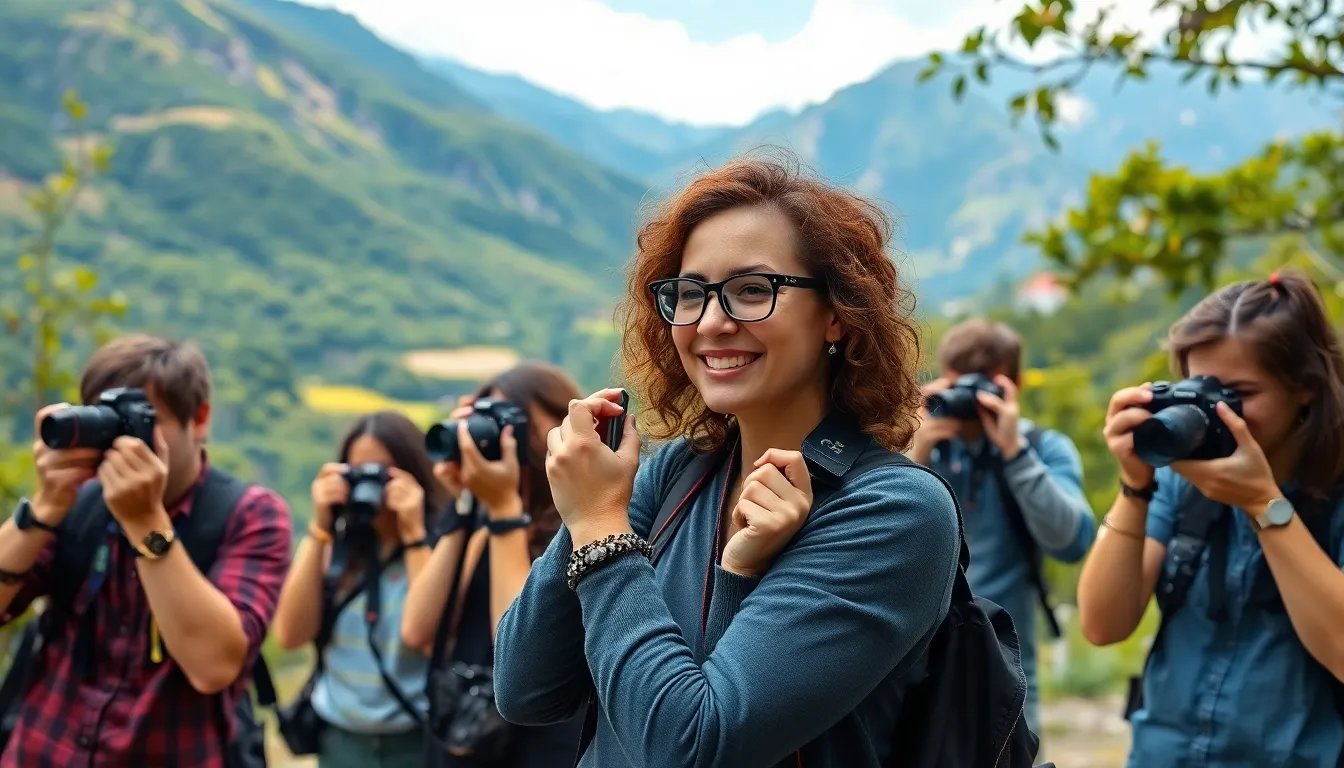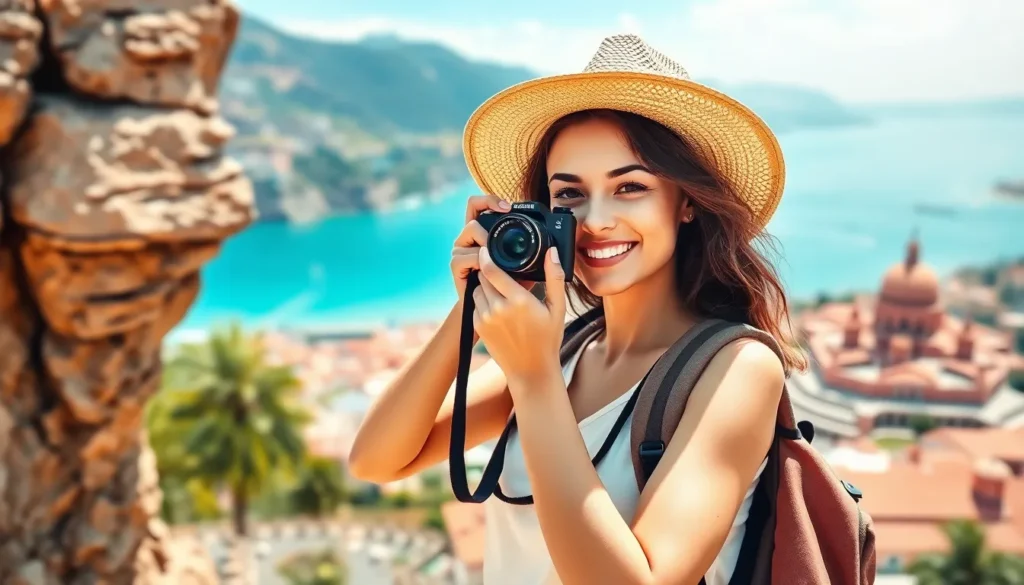In a world where everyone’s a self-proclaimed photographer thanks to smartphones, standing out requires more than just a good filter. Travel photography courses offer the perfect blend of skill and adventure, helping aspiring photographers capture breathtaking moments while exploring the globe. Whether it’s mastering the art of composition or learning to chase the perfect light, these courses turn ordinary trips into extraordinary visual stories. Imagine wandering through vibrant markets or majestic landscapes, armed with the knowledge to snap that envy-inducing shot. With expert guidance and hands-on experience, students can elevate their photography game from “meh” to “wow.” So why not trade in that mediocre vacation selfie for a stunning portfolio that’ll make friends green with envy? Dive into the world of travel photography courses and unlock the secrets to capturing memories that last a lifetime.
Travel Photography Courses
Travel photography courses cover essential skills for capturing stunning images on the go. Participants learn techniques such as composition, lighting, and post-processing, which elevate their photography. These courses often take place in various destinations, allowing students to practice in real-world scenarios. Workshops led by experienced photographers provide personalized feedback, enhancing learning experiences. Travel photography courses typically cater to all skill levels, from beginners to advanced photographers. Each course emphasizes hands-on experience, encouraging students to experiment with different styles and subjects. Many programs focus on storytelling through visuals, teaching photographers to convey emotions and narratives. Structure and rhythm in photography become evident through guided exercises, fostering creativity. Networking opportunities arise as students interact with peers and instructors, leading to valuable connections in the photography community. Course durations vary, with some lasting several days while others span weeks. Online options also exist, providing flexibility for those who can’t travel. Learning materials, such as videos and e-books, supplement in-person instruction and allow for additional practice at home. Photography equipment recommendations often arise during these courses. Students receive guidance on selecting the right gear based on their personal style and travel preferences. Practical tips for managing equipment during trips also help streamline the experience. Travel photography courses enhance photographers’ skills, boost confidence, and lead to impressive portfolios that showcase their growth.Types Of Travel Photography Courses

Online Courses
Online courses offer flexibility for learners. Students can access lessons from anywhere, accommodating busy schedules. Instruction includes video tutorials, e-books, and interactive assignments. Numerous platforms provide options that cater to different skill levels. Some courses emphasize editing techniques using software like Adobe Lightroom. Others focus on composition and storytelling for impactful images. Networking often occurs within course forums or groups, allowing students to share experiences and receive feedback.In-Person Workshops
In-person workshops provide hands-on experience in real-world settings. Participants often travel to scenic locations, enabling practical application of techniques. Interaction with instructors allows for immediate feedback, enhancing the learning process. Workshop sizes typically remain small, fostering personalized attention. Students engage in collaborative exercises that inspire creativity and confidence. Exposure to various styles and techniques occurs through different shooting scenarios. Attendees also benefit from connecting with like-minded individuals and building a supportive network within the photography community.Key Features To Look For
When selecting a travel photography course, consider several key features that can enhance the learning experience. Focus first on the course content, as it’s crucial for skill development.Course Content
Course content should cover essential topics like composition and lighting. Look for programs that incorporate real-world scenarios allowing photographers to practice in unique settings. Workshops often provide exercises focused on storytelling through visuals. Learning different photography styles and subjects enhances creativity. Effective courses also include post-processing techniques that refine a photographer’s work. Supplementary materials like e-books and videos support further skills development.Instructor Experience
Instructor experience plays a significant role in the quality of the course. Instructors should have substantial backgrounds in travel photography and teaching. Experienced professionals often provide personalized feedback tailored to individual skill levels. Their insights into different techniques can help students improve more quickly. A strong instructor often fosters an engaging environment, making it easier for participants to express creativity. Additionally, instructors who encourage networking can create valuable connections among students and other photography professionals.Benefits Of Taking Travel Photography Courses
Travel photography courses provide numerous advantages that enhance skills and creativity. Personal growth occurs as participants explore new techniques and styles, leading to improved confidence in their abilities. Skill development plays a critical role, as courses cover key topics like composition, lighting, and post-processing strategies. Networking opportunities arise within these courses, facilitating connections with peers and experienced photographers. Many students benefit from mentorship, receiving personalized feedback that helps refine their craft. Engaging with diverse perspectives encourages creativity, fueling inspiration for future projects. Hands-on experience significantly enriches learning. Students practice capturing real-world images in various settings, allowing them to adapt techniques to different environments. Immediate feedback from instructors helps address challenges and fosters a supportive atmosphere. Online and in-person course formats cater to different learning preferences. Flexibility in online learning enables individuals to progress at their own pace, while in-person workshops offer instant interaction and collaboration with experts. Both formats emphasize the importance of storytelling through visuals, teaching participants how to evoke emotions and convey narratives through photography. Selecting the right course also streamlines the learning experience. Individuals should prioritize programs that cover essential skills and provide access to supplementary resources like videos and e-books. Experienced instructors add immense value, enhancing the educational environment and encouraging peer connections. Ultimately, travel photography courses equip individuals with the skills and confidence needed to create stunning portfolios, elevating their photography journey and capturing unforgettable moments.Recommended Travel Photography Courses
Several noteworthy travel photography courses cater to various skill levels and learning preferences. The following list highlights some of the top options available:-
- National Geographic Travel Photography Course
-
- The Great Courses: Travel Photography
-
- MasterClass: Jimmy Chin Teaches Adventure Photography
-
- Skillshare: Travel Photography Starter Kit
-
- Udemy: Travel Photography – Take Better Pictures of Your Adventures
-
- Photofocus: Travel Photography Workshops
-
- CreativeLive: Travel Photography Essentials

